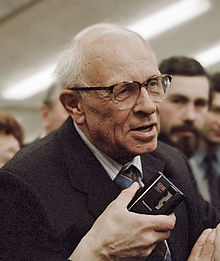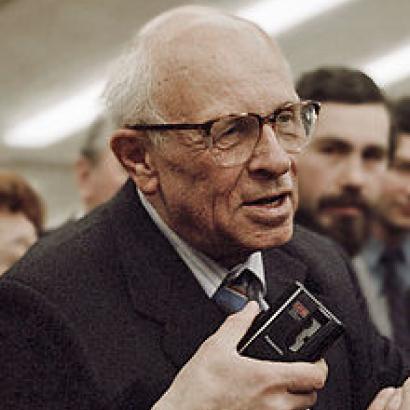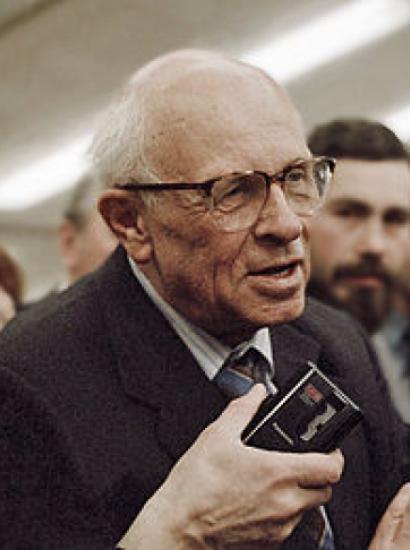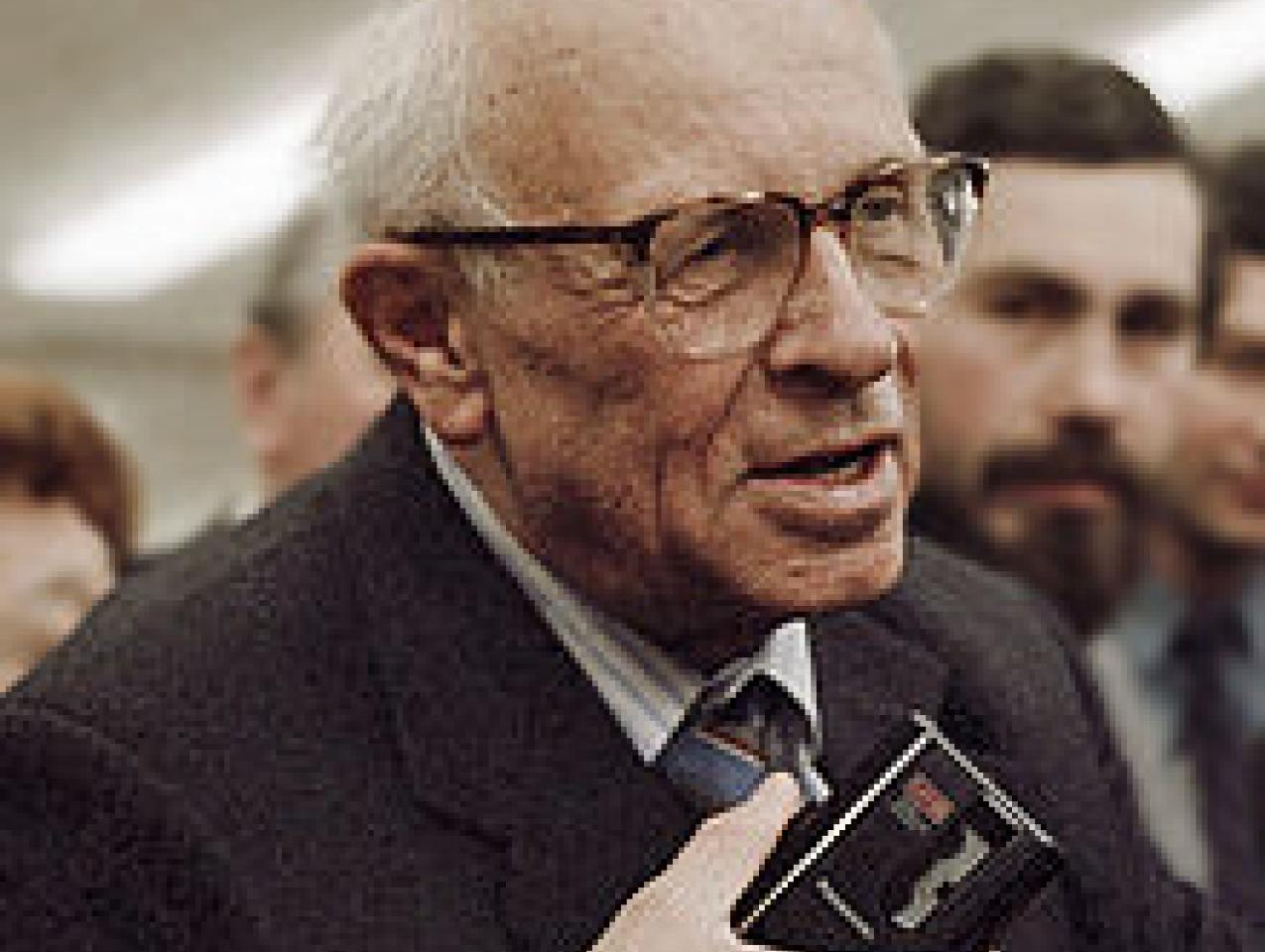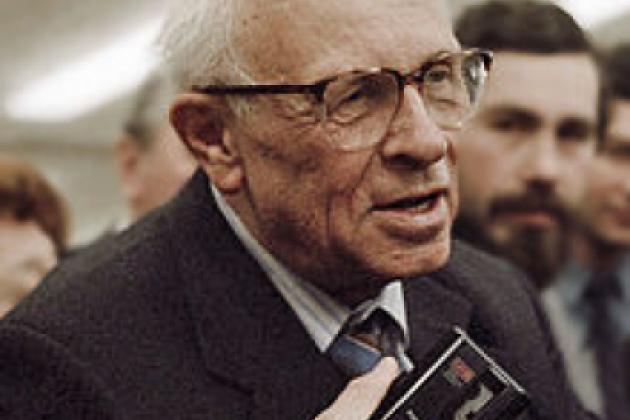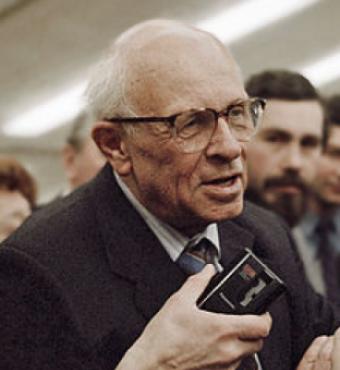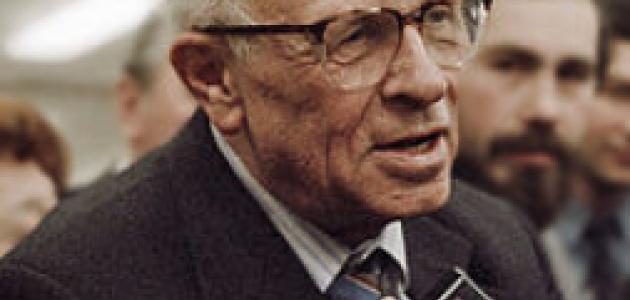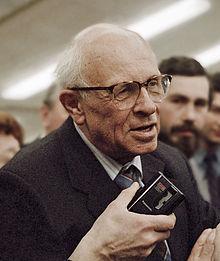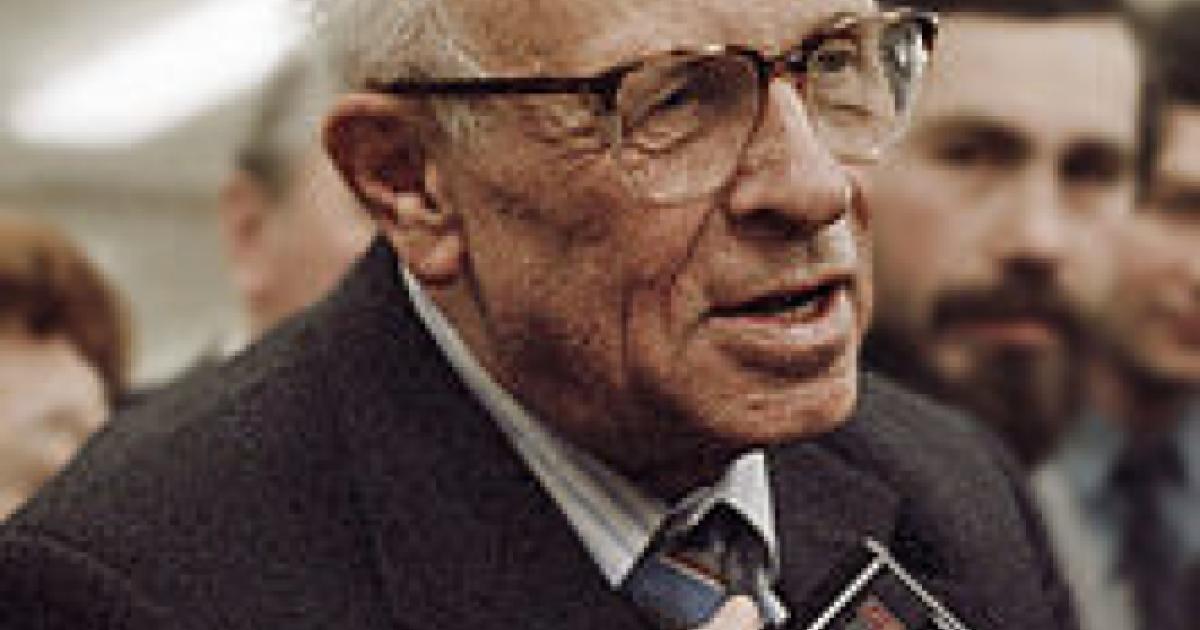- History
Editor's note: This essay is an excerpt from the Hoover Press book Andrei Sakharov: The Conscience of Humanity.
December 14, 2014, was the twenty-fifth anniversary of Andrei Dmitrievich Sakharov’s death. He holds an honored place in the pantheon of the world’s greatest scientists, reformers, and champions of human rights.
I never personally met Sakharov—he was whisked off to internal exile in Gorky soon after I arrived, and returned to Moscow soon after I left. But I did get to know his wife, Elena Bonner, well, and through her, through their hunger strikes, through the dissident trials during my time in Moscow, and through the moral power that Sakharov continued to exert from his isolation in Gorky, he played a central role in my reporting.
Still, I find today that defining Sakharov’s exact place in Soviet history is no easy task. As Sakharov himself said so often, “the truth is never simple.” Neither is legacy.
Certainly there was no one like him in the dissident movement, no one who rose to such exalted heights and was so prepared to lose everything in support of human rights; nobody who had his combination of activism and modesty, boldness and shyness.
His very existence was something of a miracle. A descendant of priests and military officers, he was born to that genteel class of Russian intellectuals and professionals known as the intelligentsia, which through Russian history produced revolutionaries, poets, and scientists convinced that the most important thing was to do something useful.
Much of the old intelligentsia fled after the Russian Revolution. Many of those who survived were caught up in the purges; and if they survived that, there was the war.
Sakharov survived, and his genius found him a place in the machinery created by Joseph Stalin and Lavrenty Beria to assure Soviet military might. The state needed scientists, and the masters understood that science required not only coercion and threat, but also independence and intellectual freedom.
The solution was to seal the scientists in a gilded cage, isolate them in installations closed not only to foreigners but to most Soviet citizens, give them the highest level of privilege and equipment, and make clear that all this was conditional on producing what the state required.
Sakharov was a willing member of that system, convinced like so many scientists of the era that they were soldiers on the front lines of a global struggle which required sacrifice and suffering. He never repudiated or regretted creating a weapon of unimaginable power, believing that only a balance of power would prevent its use.
His embrace of human rights did not come through a sudden conversion. Scrupulously honest, and almost naïve in his understanding of politics and power, he came to it in stages. Let me give you a brief chronology of the metamorphosis.
First came his concern about the radioactive fallout from atmospheric testing. But in those years, in the 1950s, the concerns were still new, and raising them was possible within the scientific and political elite. These were issues Sakharov could take up directly with Nikita Khrushchev, even though he was at times rebuffed and put in his place for meddling in politics.
Then came the Academy of Science elections in 1964 at which Sakharov openly spoke out against accepting an ally of the pseudo-scientist Trofim Lysenko. The Academy of Science, in fact, was probably the closest to a democratic institution in the Soviet state, where full members could still vote to reject a candidate pushed by the Kremlin.
So far, Sakharov’s activities were still within the bounds of permissible debate for someone of his standing in the elite. Yet as Sakharov noted in his Memoirs, the academy vote, like the struggle against atmospheric testing, marked another step on the way to becoming active in civic affairs.
The turning point for Sakharov, as for the entire dissident movement, came in the mid-1960s. These were years in which Sakharov signed a petition against the rehabilitation of Stalin, followed by a letter against the enactment of the law against defaming the Soviet state, which became the basis for the prosecution of many dissidents, followed by a decision to join in a demonstration on Pushkin Square on Constitution Day.
Then came his first letter, this one to Leonid Brezhnev, in support of a dissident, and then his involvement in the movement to save Lake Baikal.
What is amazing to realize now is that in those years, Sakharov had such high rank that he could pick up a special phone and directly call the KGB chief, Yuri Andropov, as he did in 1967 to seek the release of the writers Andrei Sinyavsky and Yuli Daniel.
These phones, known as vertushka, connected members of the top nomenklatura [chief officials]—I managed to steal one from the Kremlin during the chaos of 1991, and I learned then that the name, vertushka, which means “dial,” comes from the fact that the elite network was the first to use dial phones.
On that call, Sakharov was told that Sinyavsky and Daniel would be released in a general amnesty, but they never were.
Step by step, Sakharov developed what he described as a growing compulsion to speak out on the fundamental issues of the age.
Finally, in 1968—that remarkable year of social rebellion the world ’round—Sakharov took the decisive step of putting his thoughts on paper in the milestone essay, “Reflections on Progress, Peaceful Coexistence, and Intellectual Freedom.”
The work coincided with a turning point in the development of the dissident movement, the Prague Spring of 1968, the rise and spectacular fall of “socialism with a human face.”
“Reflections” defined the direction Sakharov’s activism would take from that point on. For the epigraph, Sakharov chose a line from Goethe: “He alone is worthy of life and freedom / Who each day does battle for them anew.”
It was not a call to arms; Sakharov did not declare that struggle and heroic exploits are ends in themselves. They are worthwhile, he wrote, “only insofar as they enable other people to lead normal, peaceful lives.”
“The meaning of life is life itself,” he continued, “that daily routine which demands its own form of unobtrusive heroism.”
From this moment on, Sakharov’s life moved inexorably toward the recognition of the central importance of openness, justice, and human rights in shaping a normal life.
The essay also introduced Sakharov to the West. As his activism gathered pace, he was often perceived by the outside world as a Russian Don Quixote, a tousled, retiring intellectual who had built a doomsday weapon and was now tilting at the windmills of an all-powerful state.
But his friends saw a different Sakharov—a brilliant, profound, and courageous thinker who, in his purity of vision, posed a fundamental challenge to the state simply by calling evil by its name and demanding that the state abide by its own laws.
After he met and married Elena Bonner, who so effectively complemented his stature and intellect with her experience in resistance and activism, the Sakharovs became a beacon of hope for thousands of people caught up in the arbitrary injustice of totalitarianism.
They also became a clearinghouse of information to the outside world. It was enough for Sakharov to appear at the trial of a dissident and to speak to Western reporters to undermine the elaborately concocted accusations. And it was through Sakharov and Bonner that much of the information about the plight of Jews, Tatars, Germans, Russians, believers, and others came to the attention of the world.
It was inevitable that the state would finally act; and, in the end, the great scientist who once had the power to call Khrushchev, Brezhnev, and Andropov on their direct lines was sent into internal exile in an apartment in Gorky, isolated and monitored day and night.
In exile he became an even more powerful force, a symbol of nonviolent opposition in the tradition of Nelson Mandela or Mahatma Gandhi. But it is important to note that his power was never in some ideology or teachings, not in something that disciples would call Sakharovism, like the moral teachings of Tolstoyism or the Holy Russia of Aleksandr Solzhenitsyn. His power was in his example, his moral purity, his openness.
Sakharov didn’t even like the word “dissident,” probably because the thrust of the human-rights movement was to compel the Soviet Union to live by its own rules, not to challenge the system or change it.
When the human-rights movement first gained momentum, the term Russians used was pravozashchitniki, defenders of the law, or inakomyslyashchie, which literally means “those who think differently.” The West began referring to them as “dissidents” and, in the Russian pronunciation, dissident came into general Russian usage.
What kind of man was he personally? I have found him variously described as naïve, saintly, shy, diffident; to some, he was akin to that Russian character known as yurodivyi, the holy fool who speaks truth to power; to others he was the consummate scientist, applying the rigorous discipline of scientific inquiry to politics and human rights.
By all accounts, Sakharov was not easy to work with—people who dealt with him found him stubborn and uncompromising.
He could spend weeks on an essay, as he did with “Reflections,” but he could also react on the spur of the moment.
Sakharov was indeed shy and uncomfortable in social settings, but he certainly did not avoid confrontations, making his thoughts clear to the entire Academy of Science when he decided to oppose the nomination of a Lysenko ally, or pushing his way into a courtroom packed with KGB plants where a dissident was about to be tried.
I remember those trials well, though the ones I covered occurred after Sakharov was already in exile in Gorky—no matter how early we arrived, the courtroom was “full,” with room only for immediate relatives. We’d stand around outside, waiting for the inevitable conviction.
For those who see him as a meek, retiring, and compassionate genius in the mold of Fyodor Dostoyevsky’s Prince Myshkin, I’d like to recall one incredible incident he describes in his Memoirs.
Without any advance warning, Sakharov is paid a surprise visit in Gorky by Nikolai Yakovlev, one of the sleazy, corrupted writers used by the KGB to slander its targets. Yakovlev had written an especially foul book attacking Sakharov and making vile anti-Semitic insinuations about his wife, Elena Bonner, yet here he comes and offers to interview Sakharov.
Here’s how Sakharov describes what happens next: “I’d realized right away that I was going to end up hitting him.”
And sure enough, Sakharov abruptly interrupts the conversation and says, “I’d rather take care of this matter by slapping you.
“I dodged around the table. He flinched and avoided the blow, but I surprised him with an unexpected left-handed slap on his flabby cheek. ‘Now get out of here,’ I yelled, pushing the door open.”
I love to imagine that scene: so much for the passive holy fool.
There’s another passage near the end of the Memoirs that has long intrigued me. It is about that extraordinary phone call from Mikhail Gorbachev on December 16, 1986. You have to understand that Sakharov has been in exile in Gorky for almost seven years, without a telephone and largely isolated from any contacts, and suddenly a pair of technicians come in at night and hook up a phone and tell him to expect a call in the morning.
“Hello, this is Gorbachev speaking.”
“Hello, I’m listening.”
Gorbachev then tells Sakharov that his trials are over, that he and Lyusia—the name he and most everyone used for Elena Bonner—can come home to Moscow. So what does Sakharov do? He starts talking to Gorbachev about the recent death of the dissident Anatoly Marchenko in prison, he starts demanding that Gorbachev release all prisoners of conscience.
It really is a remarkable exchange, and a remarkable image of Sakharov, instinctively putting the interests of others ahead of his own at a moment of supreme triumph.
But was it a triumph? The sad truth is that the collapse of the Soviet state, which seemed to vindicate everything the dissidents fought for, did not lead to the democratic state they presumed would follow.
Would he be disappointed? Probably yes, but I don’t think that’s the sort of category he worked in. His approach was to act on what needed to be changed and reformed, and not to succumb to dismay, disappointment, or despair.
Sakharov would be ninety-three now, and I presume he would be enormously active, writing letters and statements about Ukraine, Georgia, Moldova, and on behalf of Sergei Guriev, Vladimir Yevtushenkov, gay people, or the late Sergei Magnitsky.
He certainly did not pause to celebrate or to gloat when the Soviet state collapsed. He died on December 14, 1989, while working on a speech about the rights of suspects in criminal cases. Those were years of a huge upsurge in violent crime in Russia and, typically, Sakharov was thinking to the end about the rights of individuals.
He told Lyusia he was going to take a nap, but when she went into his room later he had passed away.
* * *
As I said at the outset, I never met the man, to my great regret.
I arrived in the Soviet Union as a correspondent on January 1, 1980, and of course one of my priorities was to meet Sakharov. My background is Russian, and we spoke Russian at home and closely followed developments in the Soviet Union.
My father, a Russian Orthodox theologian, had a weekly broadcast to the Soviet Union over Radio Liberty, and already as a boy I remember the thrill of the intellectual and creative “thaw” introduced by Nikita Khrushchev, and the Russian movies and records that began to reach America in those years, and the enormous excitement of reading Solzhenitsyn’s One Day in the Life of Ivan Denisovich.
The human-rights movement had unfolded while I was an undergraduate in the 1960s—my campus was on the other side of the continent, and we had no palms—and I followed it with a passion.
The year 1980, when I arrived in Moscow as a correspondant, was a low time in US-Soviet relations—not that there had ever been really good times. A few days before our arrival, the Soviets had invaded Afghanistan. Relations with the West plummeted. And with the Moscow Summer Olympics scheduled for that summer, the KGB was hyperactive.
Sakharov, of course, was already known in the West as a dissident. His “Reflections” had come out in the West in 1968; in 1970 he and other dissidents had founded the Committee on Human Rights, he had married Elena Bonner in 1972, and by the time we arrived the dissident movement was Sakharov’s primary occupation, and he was a major thorn in the side of the regime.
When I arrived I thought I was ready for the worst. I was friends with George Krimsky, the AP reporter expelled for his close contacts to Sakharov. I thought I knew how the KGB functioned, that every second person was an informer, that we would be listened to and followed. But knowing all this in theory is not the same as seeing it in reality. Nothing really prepared me for what happened January 22.
That was the day on which the authorities finally moved against Sakharov. We first heard about it from Liza Alexeyeva. She was the fiancée of Bonner’s son Alexei Semyonov, who had left the Soviet Union, and she managed to get a call to Western reporters as soon as she heard that Sakharov had been seized.
I rushed to the apartment building on Chkalov Street where Sakharov lived—it was a stretch of the ring road now again called Zemlyanoi Val. There was already an army of uniformed and plainclothes officers keeping everyone at bay. But it was more than that—it was an extraordinary display of power and paranoia, of a superpower going to extreme lengths to silence just one man.
Every telephone, private and public, within a radius of at least a kilometer was cut off, as were the phones of all of Sakharov’s close colleagues. Traffic was stopped in both directions. As the facts came out, we learned that a special Aeroflot flight was assigned to fly Sakharov and Bonner to Gorky, with only a dozen KGB agents on board.
Sakharov’s description of the flight is another one of those passages that I find revealing of the man. Someone else in his place might have focused on the drama and horror of the event, but Sakharov noted that so long as he and Lyusia were together, “we were actually happy.” And he also notes, “Normally there’s no meal service on short flights, but on this one we were served a first-class dinner.”
The extraordinary measures taken by the state to exile Sakharov, including the constant surveillance, the personal jamming station, the innumerable summons and harassments, were a testament to the moral power that Sakharov had come to wield by then.
It was also a testament to the fragility of the totalitarian state, which knew instinctively that someone who spoke the truth posed an existential threat to the system. There are not many figures in modern history who wielded such power—Nelson Mandela did, and perhaps Aung San Suu Kyi in Burma, but who else?
By evening, Liza Alexeyeva and Bonner’s formidable mother, Ruth Bonner, a veteran of barricades and the gulag, were allowed to open the door to reporters, and we learned the details—that Sakharov had been stripped of his state awards and flown off to internal exile in Gorky, a city then off-limits to foreigners.
Let me also note here that being stripped of his three Hero of Socialist Labor awards was no small matter. This was a very prestigious and important award in the Soviet Union, and it carried a broad range of important benefits in pay, housing, and travel. Only 180 people received it twice; a mere sixteen people had three, like Sakharov. The protocol of the award said that if you got it twice, your bust had to be raised in your hometown; if you got it thrice, they were supposed to build a statue in Moscow. None were built for Sakharov in Soviet times.
* * *
For the first period of Sakharov’s exile to Gorky, until May 1984, Elena Bonner was allowed to travel freely to Moscow, and she chalked up more than a hundred sleepless nights on the overnight train. In that period I came to know her quite well.
It’s hard to remember all the dates from that time, since unfortunately I did not keep a diary, but I remember that for some inexplicable reason, the car following me changed when Lyusia was in town. It was usually a tan Zhiguli—that’s the Soviet version of the old Fiat 124 that was the most sought-after sedan in Russia at the time—which would be there waiting whenever I ventured out of our compound on the garden ring. But when Bonner was in town I’d find a bigger and more official Volga.
Why, I don’t know. But it demonstrated the premium the KGB placed on Sakharov and Bonner. Maybe, just maybe, the KGB wanted reporters to see Bonner so the world would be reassured that Sakharov was alive and reasonably well.
Another curious fact is that the guards outside her building did not pull an overnight shift, so that I would come after 2 a.m., often to find an apartment full of friends and foul cigarette smoke. Maybe the idea was to keep the visits as hidden as possible, or to make Sakharov’s friends suffer. But the Russian intelligentsia habitually sat around late into the night, so for the Russians it was normal.
My visits were primarily to learn about Sakharov’s state. But the apartment on Chkalov Street also remained a clearinghouse for dissident information, as it had been when Sakharov lived there. There was always a dissident from some far-off province who had come to seek help, and they would often hand out fuzzy carbon copies of some declaration.
Some of the visitors were anxious, and talked only in the bathroom with the faucet running, to hide the conversation from the microphones that no doubt were everywhere. Lyusia herself dispensed with any such precautions, as had Sakharov, speaking openly and loudly in full knowledge that the KGB was listening to every word.
That was part of their approach, which differed radically from that of dissidents like Solzhenitsyn, who went to extraordinary measures to keep his conversations secret from the KGB. For the Sakharovs, there was no conspiracy, no secrecy, to their work: their whole point was that what they were doing was fully legal under Soviet law. They were not calling for rebellion, or regime change, or even different laws; only for obedience to the existing law, and that they not only did not want to hide, but they wanted the authorities to hear.
Lyusia was a remarkable woman. Let me quote here from a piece I did about her when she died in June 2011, age eighty-eight: “She was an imposing presence with her thick glasses, and a loud, clear voice that carried the authority of a sergeant-major—she had been an officer on the front. She could be quite forceful with reporters—she would demand that we publish her communiqués verbatim or not at all.
“But at times she was also ready to sit back with a cigarette and a dreamy smile and talk about being a front-line medic in World War II, about her postwar life as a pediatrician and a believing Communist Party member, about her two children, and about her final conversion to open dissent after the Prague Spring of 1968, the date from which the Soviet human-rights movement truly dates.”
I would also turn to Bonner for help. One of my strongest recollections is not connected to Sakharov, but to a dissident named Vladimir Borisov who had been expelled to the West for his effort to create a free trade union. In July 1980, I got a call from his wife, Irina Kaplun, asking to see me.
She was on her way to catch a train to Tallinn, Estonia, and as we walked to the train station, a man popped up from behind a car and photographed us. She passed on some information and went on her way. On the next day, I learned that she had been killed in a car crash on arrival to Estonia. From abroad, her husband accused the KGB of murder.
Bonner was in Moscow, and she went directly to Tallinn. She called on her return to tell me that there was no question that it was a real road accident. Certainly the dissident cause would have been advanced by letting suspicions fester and letting the Kremlin squirm, but Bonner and Sakharov always saw their strength in speaking truth, not in propaganda.
That was the way the Sakharovs were. Though their own lives in Gorky were intolerable, marked by excruciating hunger strikes, isolation, and harassment, they continued to the best of their ability to help others, whether dissidents or their kin.
I must note here that while I have very strong and fond memories of Elena Bonner, I am not sure what impression I left on her. In November 1985, I flew to Italy with her when she was finally allowed to leave the country for treatment of glaucoma and heart problems, and we talked the whole way over about their lives in Gorky, the success of their hunger strikes in getting the authorities to let Liza Alexeyeva, now Bonner’s daughter-in-law, emigrate, and about everything else that was happening.
In her memoirs, however, Elena Bonner wrote that she had no memory of the flight over. Frankly, since all I did was to prompt her memories, there is no reason she should remember, and I remain grateful for all the time I spent with her.
I only wish I could have spent as much with Sakharov. But by the time he was released, I was stationed in Germany, and by the time I returned to Russia for another stint, he had died.
* * *
I’d like to say a few words about Sakharov’s legacy. Sakharov’s own path from a willing servant of the state to a dissident willing to starve himself to death for a young woman’s right to emigrate was hardly rapid or linear, as I’ve already noted. It took his thinking decades to evolve from the belief in the Soviet state as the prototype for the future world, to a sense that all governments are bad, and finally to the realization that the messianic pretensions of the Soviet state created a unique system of totalitarian repression.
At the outset of his career at Arzamas, the super-secret “Installation” in which he worked on the Bomb, a lot of the lesser work was done by zeks, gulag inmates who were marched to and from their jobs, fed pathetic rations, and housed in crowded barracks. Sakharov was aware of them and their plight, yet it took many more years before this grotesque violation of human rights became one of his causes.
I would argue that this was not hypocrisy—not a deliberate blindness to the suffering of others. I think we in the West too often underestimate the fundamental patriotism that motivated Russians to fight so valiantly against Nazi Germany, and we too often underestimate the idealism that existed among Soviet citizens, Communists and non-Communists.
Elena Bonner was proud of her party card, as were many of the dissidents I met. And Sakharov, though he declined to join the party, was an uncritical believer in the merits of socialism over capitalism until his eyes opened to the violations of human rights.
For him, as for virtually all Soviet citizens, World War II—the Great Patriotic War—was an elemental struggle for survival. It remains to this day one of the most powerful collective memories among Russians; it is not accidental that Putin refers to Ukrainian nationalists as fascists or invokes other images of the Great War.
Sakharov himself had been hustled to the rear to work on munitions, and fully shared in the sense of urgency and sacrifice of a nation fighting for survival.
In that world, Stalin was first and foremost a war leader, who not only had to pull Russia through a mortal threat but had to build up its power after the war so that it could not be attacked again.
I spoke with many older Russians when I lived there, and especially when I was writing a book about the village of my ancestors. The sense of collective sacrifice and heroic struggle was a recurring theme.
Like those people, Sakharov knew of the crimes committed under Stalin, and he was aware of the zeks working alongside him, but all that was subordinate to the national sense that the times required sacrifice and suffering.
That applied also to the awesome weapon Sakharov was developing. This is what he wrote:
“I understood, of course, the terrifying, inhuman nature of the weapons we were building. But the recent war had also been an exercise in barbarity, and although I hadn’t fought in that conflict, I regarded myself as a soldier in this new scientific war.”
The passage ends, as do so many of his other efforts to explain the evolution of his political thinking, with: “The truth is never simple.”
* * *
I am not trying to justify or to defend Sakharov. God knows he does not need my defense or justification. But in the years I spent in the Soviet Union and in Russia, I tried to understand how people survived through the combined hell of Stalinism and the war, how people maintained their integrity, how they survived.
The dissidents were only a small part of that complex truth, but they were an enormously demanding group, who saw Western journalists as their allies in a struggle with a totalitarian system. They certainly deserved support. And trying to get their stories out to the West entailed huge risk. After Yuri Andropov, a long-time head of the KGB, became the Soviet leader in November 1982, the repression became even heavier as the KGB began systematically rounding up members of the human-rights movement.
To this day I suffer over the decisions I had to make on what to report and what not to report. I confess Lyusia often chided me harshly for not dedicating myself exclusively to the cause of human rights.
She believed that it was our duty, our obligation—as free men and women residing in the Soviet Union—to dedicate ourselves to the cause of human rights. The notion of journalists as objective, neutral witnesses was alien to the dissidents, as it was to the authorities who saw us as tools of Western propaganda.
And to be honest, the entire notion of neutrality or objectivity was hard to define in a society where reporting the reality was in itself a political act, and where all sides saw us as soldiers in the Cold War.
I remember a diplomat at the American Embassy, presumably from the CIA, demanding that I give him the names of some Russian sources of mine. When I refused, he angrily asked, “What side are you on, Schmemann?”
Throughout my years there, my guidance was something that Lydia Chukovskaya, the daughter of Russia’s favorite children’s author, Kornei Chukovsky, told me when I first visited her in the large dacha in Peredelkino which she maintained as a museum to her father.
Lydia was an author and active dissident herself, but what she said was this: “Yes, do not neglect the dissidents. But never forget that there are 268 million other people who wake up every morning in this country who are not dissidents.”
That struck me forcibly because I could not be sure what I would have been had my grandparents not left after the revolution. I suspect I would’ve been among the 268 million, trying to survive with as much integrity as I could but falling short of the martyrdom that dissidence amounted to.
These are the people who interested me, the people who tried to maintain a modicum of self-respect and integrity in a system that demanded total fealty.
And surviving in that system was not necessarily moral failure. Though the active, known dissidents numbered a minuscule percentage of the population, the large majority of people I met resisted the system to the degree they could, listening to the foreign short-wave radio broadcasts, reading and copying the samizdat literature, secretly baptizing their children, studying Hebrew, writing “for the drawer,” as the expression went.
One of the many great books published when glasnost made it possible was Notes of a Survivor by Sergei Golitsyn. He was a member of a princely family that ended up stranded in the Soviet Union and suffered for it. Such aristocrats who survived were forever reminded that they were byvshye lyudi, the former people.
Golitsyn describes being a small boy in the 1920s when one after another of his uncles and aunts were taken away for questioning, some never to return. He recalls assuming that his turn would eventually come and wondering how he would behave. He resolved that whatever else happened, he would never renounce his belief in God.
That was his red line, and I know many other people had a red line in their conscience, a point beyond which they would refuse to answer or cooperate. By the time I got to the Soviet Union in the 1980s, the KGB had become quite sophisticated about finding that red line and pushing people right up to it, but not over it. Many people who were questioned became so determined not to divulge what they had vowed to defend that they failed to realize how much the KGB was getting out of them. The KGB was damned good at interrogations.
By the same token, many honest people who never wanted to become a dissident became one because they were pushed to the limits. People like Lev Kopelev, who had sat in the camps, was an earnest Communist who only wanted to study German culture afterward. But as one after another of his friends was arrested or exiled, he finally signed a protest and was himself sent into exile.
For some people who struggled to function within the system, the moral absolutism of the dissidents was an irritant, a constant moral judgment on their own acceptance of the phony elections, party meetings, and innumerable other acts of fealty and obedience demanded by the state.
One of Sakharov’s superiors, Efim Slavsky, summed up this attitude when he assailed Sakharov for turning against the system he had served: “Without a strong hand”—that was Stalin, of course—“we could never have rebuilt our economy after the war or broken the American atomic monopoly—you yourself helped do that. You have no moral right to judge our generation—Stalin’s generation—for its mistakes, for its brutality, you’re now enjoying the fruits of our labor and our sacrifice.”
Slavsky might have noticed, too, that many of the best-known dissidents were scientists who could have lived quite comfortably had they not challenged the system. Yuri Orlov, Sergei Kovalev, and Valery Chalidze, for example, were prominent or promising physicists.
That is not a coincidence, for reasons I know will be discussed here in coming days: science is by its very nature international, questioning, rational, and therefore inherently resistant to ideology and myths. Lysenko and his pseudoscientific ideas were of course a glaring example of ideology co-opting science, but Lysenko was the exception that proves the rule.
For these scientists, many of whom worked on programs to assure the security of the Soviet state, the evolution of their thinking was a continuation of their scientific inquiry, complete with doubts and questions.
“I am not a professional politician,” Sakharov wrote. “Perhaps that is why I am always burdened by doubt about the usefulness and consequences of my actions. I incline to the belief that a combination of moral criteria and unrestricted inquiry provides the only possible compass.”
A common criticism, made by Solzhenitsyn and some other dissidents, was that Sakharov spread himself too thin, that he took on campaigns that did not advance the cause, whether it was the human-rights movement, or science, or the cause of people.
The criticism became especially sharp when Sakharov and Bonner began a hunger strike to win an exit visa for Liza Alexeyeva, Bonner’s daughter-in-law. They won, but many dissidents assailed Sakharov for risking his life over a trivial family affair.
An even stronger, and far more pernicious, criticism was that Sakharov was somehow deflected from his true cause by Elena Bonner. These insinuations were spread by the KGB, with distinct anti-Semitic overtones, based on the fact that Bonner was half-Jewish—her Armenian half was never invoked. It also came from the pen of Solzhenitsyn, leading to a conflict between the two giants of dissent.
Bonner certainly was tough and uncompromising, and I don’t doubt she told Andrei exactly what she thought. She was born to fiery Communists who were repressed in the purges, she was steeled by war, and she welcomed the fight. She enjoyed telling me the story of how she knocked down a policeman who tried to push her away at the trial of Yuri Orlov. It was a skill, she said, that she developed fending off overly friendly soldiers at the front, and it landed her in jail for fifteen days.
But to portray Sakharov as someone who could be manipulated by her simply overlooks his history before he met Bonner, and his personality. This is a man who had confronted Politburo members face-to-face. And as his thinking evolved—through opposition to Lysenko, through the realization of the deathly danger of nuclear tests, through support of people he believed were being mistreated by the authorities—he never hesitated to speak out and act, whatever the potential danger to his own career.
Of course, he was not a saint; he himself acknowledged many dubious decisions; but there was an astounding clarity to his thought and to his morals. He was simply not the kind of man who could be manipulated.
His relationship with Lyusia was something quite different. It was on one level a true love affair. To read their accounts of each other, or to hear Lyusia talking about Andrei, as I often did, there was no question of a deep love.
I remember Lyusia telling me she had to get back to Gorky because Andrei was fixated on a physics problem, and at such times, she said, he simply forgot to eat. And when she talked about him, her face would break into a gentle smile.
Bonner and Sakharov were on two very different and separate tracks that merged in the human-rights movement. She was a hereditary rebel, daughter of ardent Communists and veterans of the gulag, a war veteran and fearless warrior. He was the elite scientist moving steadily toward an awareness of the inherent injustice of the system.
Their paths converged, symbolically, at a dissident trial in 1970, and merged a year later, so that what Sakharov did thereafter, and what Bonner did, was one action.
Sakharov did not think in terms of abstract and grand causes, or of his own role as a symbol or leader. Liza may have been the immediate reason for the hunger strike, he wrote in his Memoirs, “but in a broader sense, it was the consequence of all that had happened to us, including exile in Gorky, and a continuation of my struggle for human rights and the freedom to choose one’s country of residence—not in the abstract, but in a situation in which Lyusia and I had from the beginning felt a direct responsibility.”
This is also at the core of the contrast between Sakharov and Solzhenitsyn. They came to it from radically different directions.
For Solzhenitsyn, everything he did and everything he expected of other people was subordinate to his mission, which was based on an idealized Russian character and religion. I saw that firsthand when Solzhenitsyn first arrived in the United States, because in the beginning he was very close to my father, an Orthodox theologian. But it soon became clear that Solzhenitsyn had little interest in my father’s work in America, which involved the Orthodox Church in America. What concerned him was Russia, holy and great.
In an article Sakharov wrote in response to Solzhenitsyn’s “Letter to Soviet Leaders,” he warned that politicians who follow in the footsteps of ideologues tend to be more dogmatic and ruthless than their mentors. There’s something prophetic in that warning, given how Vladimir Putin, who was blessed by Solzhenitsyn, has built his politics around the notion of Russian greatness and destiny.
It was in the clash with Solzhenitsyn that Andrei Sakharov provided what I think is the best description of himself and his legacy. “I’m no politician, no prophet, and certainly no angel,” he wrote. “What I’ve done and what I am are not the result of any miracle but the natural consequences of what life has made me. . . . It may be a peculiarity of my character, but I’ve never lived in luxury, and I’m not even sure what it is. . . . As I never tire of repeating, life is a complicated thing.
“Most important,” he concluded, “I have tried to be true to myself and my destiny.”
That is Sakharov’s real legacy: his honesty, his greatness, his genius, his integrity, his compassion for individuals.
He did not, alas, leave behind a Russia democratic and free. That may take generations.
Hopefully, Andrei Dmitrievich will continue to serve as a beacon and a model for those generations.







